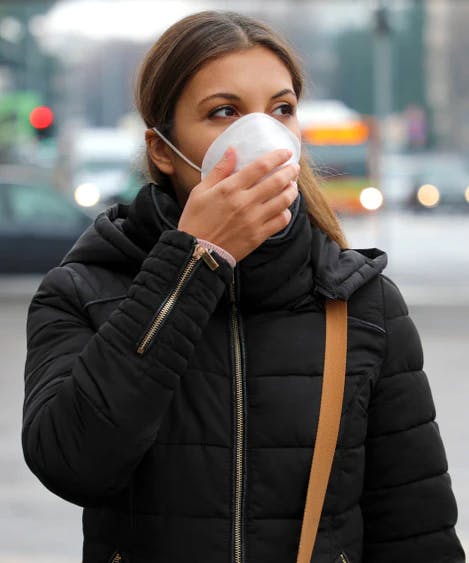Viral TikTok About Covid Pandemic Shows How Many People Are Still Struggling To Get Back To Normal Life
It may feel like the coronavirus pandemic is long gone, but there are plenty of people who still haven't been able to get back to their pre-Covid life. A viral TikTok reveals hundreds of comments showing how difficult it is for many people to live normally once again.

The year of 2020 was a difficult one for many people. We were all locked in our homes, isolated from friends and family, and even prohibited from working to make a living for ourselves. It got even worse when the Covid vaccine was introduced and many people were coerced into taking an experimental shot in order to get back to everyday life—or at least that's what they were promised. Sure enough, it turned out the vaccine didn't in fact stop transmission of the disease, meaning thousands of people were bullied into taking a shot they may have never needed in the first place. No matter what happened over the last few years, it's safe to say that life changed for just about everyone. A viral tweet that was shared on TikTok sparked a conversation about how many people have been struggling to get back to their everyday pre-Covid life.
Viral TikTok About Covid Pandemic Shows How Many People Are Still Struggling to Get Back to Normal Life
On January 28, Twitter user @JeremyWingert79 wrote a thread about the "trauma" that the coronavirus pandemic has left on many people. It went viral in the matter of hours and garnered 10.4 million views, 184,000 likes, and thousands of comments.
"My hot take is that most of us have not adequately processed the trauma of the pandemic. And our sprawling, unprocessed trauma chews away at our brains in myriad ways that make us anxious about why we can’t seem to live our lives as instinctively or as joyously as we did in 2019," he tweeted. After many people commented their support and similar experiences, he expressed gratitude for knowing there were others out there going through the same thing.
"Holy smokes, you guys. Thank you so much for the solidarity. It means a lot to know that others have a similar feeling about all of this. (Even if I did overstate the 'joy' of 2019. I do remember a different kind of angst in the Trump era, but Covid amplified that exponentially.)," he wrote.
"Yes. 100%. I feel like COVID revealed a brokenness in our society that was maybe always there. A refusal to do the right thing for others. A band-aid over a deep wound. A sense that the cavalry isn't coming, and we're on our own," someone wrote.
"You are correct and it’s part of the plan. We’re not allowed to mourn the millions dead, the millions more disabled, to want to continue being careful because 'we have to get back to normal.' We don’t have to actually. We can recognize what happened and is still happening," another person tweeted in response.
"The trauma is ongoing for those of us who are high risk or who have high risk family members. Imagine being unable to safely go about in public and on top of it, every unmasked face is a reminder that society considers your disabled children to be expendable," one person tweeted.
As the conversation continued on Twitter, these tweets were also shared on Tiktok, where hundreds of comments indicated that there are even more people who feel traumatized and even terrified since Covid emerged. TikToker @m111nk shared the tweets on her profile.
People chimed in to share how they have unresolved trauma since the coronavirus pandemic began in 2020. Reading through these accounts is both sad and reflective of the state of our society and how successful the government was at instilling fear deep into the minds of everyday Americans.
"I've noticed that I just become a lot more anxious about things that I was carefree about like going out anywhere and now I think of what can go wrong," one person wrote.
"The fact that it's still not over either. I still don't feel safe going out tbh. Everyone else just ignores it and pretends it doesn't exist," another wrote.
"It's literally hard for me to leave the house," one person said.
"I was 23 when the pandemic started, now I'm 26 and don't know how I got here. Full on survival mode/dissociation, the time is passing at warp speed," someone wrote.
This goes on and on, and each comment is more upsetting than the last. Many young adults talk about their inability to leave the house, how they grieve the person they used to be in 2020 vs who they are now, their shift from being extroverted to introverted, etc. It seems that there's a whole generation of people who have had their lives destroyed by the coronavirus pandemic, and it's especially concerning to think about how these young people's lives will be changed forever.
According to the World Health Organization, the coronavirus pandemic triggered a 25% increase of anxiety and depression around the world, referencing fear of infection, loneliness, and suffering and death as things that plague the mind of people everywhere. Mental Health America also reports that the number of people seeking mental help health online increased significantly from 2020 to today. There was a 500% increase of people who completed a mental health screening from 2019 to 2021. It's impossible to deny that the pandemic has done irrevocable damage to people's mental health over the last couple years, and the saddest part is, there is nothing being done to treat this epidemic.